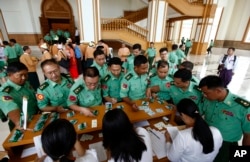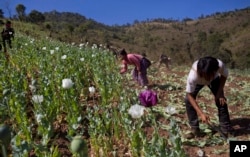Military officials and lawmakers in Myanmar have voiced disappointment over the southeast Asian nation's lacklustre efforts to combat illegal drugs, urging it to step up the battle on the narcotics trade.
Drugs pose a major headache for the government led by Aung San Suu Kyi, which governs the large, impoverished and fractious country after winning a landslide election victory in November.
Most drugs are produced in border areas controlled by ethnic minority rebels or by militias allied with the military.
"The narcotic drug problems have become perennial ones in Myanmar, just like in other countries," the state-run Myanma Alinn Daily on Wednesday quoted Lt. Gen. Kyaw Swe, the home minister, as saying.
Myanmar was directly ruled by the military until 2011, when a semi-civilian government took power. The Ministry of Home Affairs is one of three ministries overseen by the military.
The statement came during a two-day discussion of drug-related issues by nearly 20 lawmakers in parliament's upper house.
"Some government employees are engaged in drugs trafficking and abuse," lawmaker Okka Min said on Monday, urging police to work more closely with ordinary people to root out traffickers.
"Although the police do not know who is trafficking the drugs, the people do," he added. "When the police try to arrest the traffickers acting on tip-offs, nobody gets arrested. The culprits have fled after receiving information in advance."
For decades, Myanmar has been a major producer of opium and its refined form, heroin, and is now also a major source of methamphetamine pills found across Southeast Asia and beyond, a United Nations agency on drugs and crime said last year.
Police figures show 49.95 million of the pills were seized in 2,815 busts across Myanmar last year.
The deputy home minister, Maj. Gen. Aung Soe, enumerated a series of measures planned to combat the drug problem.
"More budget will be sought from the government, the police force will be expanded and laws to combat narcotic drugs will be amended, in addition to promoting educational campaigns," he said.


